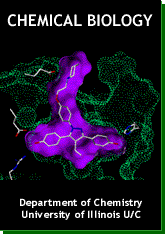Recent advances in chemistry, molecular biology, and biophysics are presenting us with spectacular opportunities both to increase our understanding of biological systems at the molecular level and to attack medical problems.
For individual faculty research in Chemical Biology, please see the Chemical Biology faculty page.
 Chemists are addressing problems in biochemistry, pharmacology, cell biology, structural biology, and medicine by designing and constructing small molecules as spectroscopic probes, functional analogues, and diagnostic and therapeutic agents. In turn, the methods of molecular biology, biomimetics and genetics are providing approaches and solutions to chemical problems, by mutagenesis to probe the mechanisms of enzymatic reactions, by production of large quantities of pure proteins for spectroscopic and biophysical studies, and by convenient generation of structural diversity. The application of computational methods to complex biological systems is having a major impact on the way chemical tools are being used in biology, through the creation of computer-based models of small molecules and macromolecules whose interaction energies and dynamics can then be measured.
Chemists are addressing problems in biochemistry, pharmacology, cell biology, structural biology, and medicine by designing and constructing small molecules as spectroscopic probes, functional analogues, and diagnostic and therapeutic agents. In turn, the methods of molecular biology, biomimetics and genetics are providing approaches and solutions to chemical problems, by mutagenesis to probe the mechanisms of enzymatic reactions, by production of large quantities of pure proteins for spectroscopic and biophysical studies, and by convenient generation of structural diversity. The application of computational methods to complex biological systems is having a major impact on the way chemical tools are being used in biology, through the creation of computer-based models of small molecules and macromolecules whose interaction energies and dynamics can then be measured.
Clearly, the traditional boundary between chemistry and biology has become nearly seamless. Those researchers best equipped to make major advances in biology and medicine will be those able to apply an integrated combination of chemical, structural, biophysical, computational, and molecular biological methods to problems in these areas. However, the system for training researchers in the various areas of chemistry (analytical, inorganic, organic, and physical) has generally maintained a traditional, single-disciplinary focus. Although some investigators have broadened their selection of research problems or techniques, what is often lacking at the level of research training is an organized and integrated program that exposes young scientists to the full spectrum of systems and the wide array of concepts, techniques and methods that they will need to master in order to drive the future advances in chemistry, biology, human health, and the modern biotechnology industry.
To meet this critical need for researchers in the Department of Chemistry at the University of Illinois, in 1998 we created a new area of Chemical Biology to complement the traditional areas. The Chemical Biology area offers a flexible program of graduate study and research, with a diverse array of research opportunities in all aspects of chemical studies of biological systems in the laboratories of more than 30 faculty in the Department of Chemistry. The Chemical Biology area also provides a multidisciplinary seminar program, and area faculty have recently established core lecture and laboratory courses in the fundamental aspects of our discipline. As with all other chemistry areas, our graduate students have the opportunity to collaborate with groups in other departments (e.g. Biochemistry, Microbiology, and Physics). The Chemical Biology area also offers fellowship support for exceptional applicants.
Representative Research Areas and Topics in Chemical Biology
ANALYTICAL METHODS
ultramicro analysis · surface spectroscopy · neuropeptides · pressure effects on protein dynamics · carbohydrate analysis · protein mass spectrometry · scanning tunneling microscopy · atomic force microscopy · surface plasmon resonance spectrometry
MOLECULAR BIOLOGY, BIOCHEMISTRY & REGULATION
protein design and engineering · regulation of enzymes · RNA processing · heme proteins · lipoproteins · membranes and membrane-bound enzymes · DNA-cleaving enzymes · Vitamin B12enzymes · transcription · synapse formation · protein folding and modification
Organic & Inorganic Chemical Synthesis, Pharmacology
carbohydrate and nucleic acid synthesis · porphyrin systems · metal complexes · biosynthesis · molecular devices · isolation and structure determination · antiviral agents · antibiotics · molecular recognition · biomimetic chemistry · combinatorial chemistry · dendrimers · self-assembling systems · synthetic methods · asymmetric catalysis · total synthesis · amino acid and peptide synthesis
Structure, Spectroscopy & Imaging
X-ray crystallography of proteins and DNA · NMR spectroscopy of protein structure and dynamics · NMR imaging · NMR contrast agents · fluorescence dynamics · laser-induced protein dynamics · 3-D optical imaging of biostructures
Theoretical Modeling, Structure Prediction & Design
computational modeling · protein structure prediction · design of inhibitors, intercalators, agonists, and antagonists · chemical and spectroscopic probes · cell receptor dynamics · protein folding theory
For details about specific areas of research, refer to the Chemical Biology faculty page.
Chemistry Biology Interface Training Program (CBITP)
The CBITP is a training program for graduate students in chemistry and other departments whose research interests are at the chemistry-biology interface. Formal participation in the CBITP by first-year graduate students is based on interviews during the previous spring semester. More information about the CBITP is available at the training program web site.
Admissions Procedure
The Graduate Studies in Chemical Biology is an area within the Department of Chemistry and is open to any graduate student in the department. To participate in this area, follow the simple plan below:
- Follow the general guidelines for application as described here.
- On the form "Application for Admission to the Graduate College" indicate that you wish to specialize in Chemical Biology in your write-up. All the general admission requirements (transcripts, letters of recommendation, etc.) apply
- On your application under section 7c indicate "Chemical Biology"
- Mail it to the appropriate department (see below)
FOR GENERAL INFORMATION ABOUT THE PROGRAM,
PLEASE SEND YOUR APPLICATION TO:
Department of Chemistry
Graduate Admissions Office
University of Illinois at Urbana-Champaign
109 Noyes Laboratory, Box 57-1
600 S. Mathews Avenue
Urbana, IL 61801
(217) 244-6245 or (800) 516-0276 (US only)